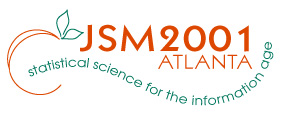|
Title
|
Room
|
|
Bayes and Empirical Bayes Methods for Data Analysis
|
M-International Salon E
|
|
Date / Time
|
Sponsor
|
Type
|
|
08/07/2001
8:30 AM
-
4:30 PM
|
ASA, Section on Bayesian Stat. Sciences*
|
Other
|
|
Organizer:
|
n/a
|
|
Chair:
|
n/a
|
|
Discussant:
|
|
|
CE Presenter
|
Bradley Carlin
Bradley Carlin
|
Description
Bayes and empirical Bayes (EB) methods enable the combining of information from similar and independent experiments, yielding improved inference for both individual and shared model characteristics. Many complex applied problems offer ideal settings for this type of synthesis. For example data on disease incidence in several adjacent counties may be partially pooled to yield a better estimate for each county, as a result of this borrowing of strength across studies.
As a result of recent advances in computing and the consequent ability to evaluate complex models, Bayesian methods have increased in popularity in data analysis. This course introduces Bayes and EB methods, demonstrates their usefulness in challenging applied settings, and shows how they can be implemented using modern Markov chain Monte Carlo (MCMC) computational methods. We also provide an introduction to and live demonstration of WinBUGS, the most general Bayesian software package available to date. The course avoids philosophical nitpicking, and instead shows how properly structured Bayes and EB procedures typically have good frequentist and Bayesian performance, both in theory and in practice. This in turn motivates their use in advanced high-dimensional model settings (e.g., nonlinear longitudinal modeling or spatio-temporal estimation and mapping), where the MCMC Bayesian approach often provides the only feasible alternative that incorporates all relevant model features.
Short course participants should have an M.S. (or advanced undergraduate) understanding of mathematical statistics at, say, the Hogg and Craig (1978) level. Basic familiarity with common statistical models (e.g., the linear regression model) and computing will be assumed, though no specialized knowledge of any single computer package or language is required. We will not assume any significant previous exposure to Bayesian methods or Bayesian computing. The course is generally aimed at students and practicing statisticians who are intrigued by all he fuss about Bayes and Gibbs, but who may still mistrust the approach as theoretically mysterious an practically cumbersome.
|
|

